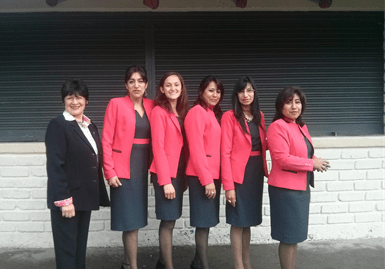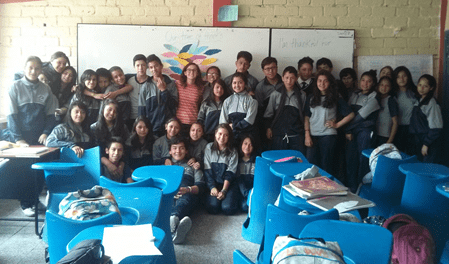By Alyssa Micek
This article is designed to facilitate discussion regarding the cultural challenges of teaching abroad as well as the valuable lessons one can learn through the process. It is based on my personal teaching experience in the Peace Corps in Ecuador.
Teaching abroad can be a very exciting and mysterious adventure with a lot of unknowns to be discovered. No matter where your teaching career takes you, you will learn a lot about yourself, the host country’s culture, and how to fit in. While it’s important to remain true to who you are, it’s equally imperative to embrace, understand, and respect the host country’s culture. I will discuss some ways to navigate these challenges.

The Honeymoon Phase
I remember when I first got off the plane in Ecuador, feelings of excitement, awe, and novelty. Everything was different and interesting! However, as you know, the “honey moon phase” eventually fades and the culture shock sets in. The time frame will vary for everyone, mine lasted about a month and a half. What was once exciting and curious, later felt annoying and frustrating. However, what I didn’t realize at the time was that these “annoying” things were important pieces of the cultural puzzle that I hadn’t quite figured out yet. With time and an open mind, I was able to understand and appreciate those things.
Culture
In Ecuador, culture is everything! From the food, to the traditional dances, and even the way people greet each other. Culture is a word that gets tossed around a lot. But what does it really refer to? Hall & Hall (1990) states that “culture can be likened to a giant, extraordinarily complex, subtle, computer. Its programs guide the actions and responses of human beings in every walk of life”.
It cannot always be seen or touched, but it exists in the threadwork of every society. Culture is embedded in everything we do, say, and hear. Language and culture go hand in hand. So, sometimes you might not understand what your colleague(s) are saying to you due to the language barrier.
However, understanding the culture will help alleviate some of the misunderstandings that will inevitably take place. I encourage you to ask questions rather than judge. Try adopting a position of “that’s interesting” rather than “that’s weird!” You can develop your sense of curiosity by asking questions which will help you understand why people do the things they do. You and your local colleagues will likely have a lot of cultural differences. The key here is learning how to embrace the differences and use them as a way to gain insight into the culture. Some of the differences you might encounter could be related to the following: concepts of time, teaching methods, error correction, target language usage, religious beliefs, and even family values. I will briefly discuss each based on my perspective and experience in Ecuador.
Time is ticking…
In Latin America, time is viewed very differently than in the United States. Time in countries like Ecuador is flexible and constantly changing. A saying that I often heard when someone was running late was “la hora ecuatoriana”. In other words, Ecuadorians are on their own time, aka always late.
This is a humorous justification people use for their tardiness. I encountered this in both my personal and professional life. I would plan meetings, workshops, clubs, you name it and people would cancel last minute, show up late, or not at all. It was very disheartening for me at first because I took it personally. However, once I realized that this is a cultural practice that happens frequently, I was able to plan accordingly and not be disappointed if things didn’t go as I had planned. Toward the end of my Peace Corps service I too found myself adopting “”la hora ecuatoriana”. My advice to you, is that if you’re teaching in a country where time is viewed similarly, don’t set your expectations too high or feel disappointed when your plans don’t work out exactly as you had in mind.
Teaching Methods
Teaching methodology is another area in which you might find yourself feeling different from your local colleagues. While there are a variety of ways to effectively teach students, some might utilize strategies that seem “old school” to you. For example, relying heavily on the book, rote memorization, and explicit grammar instruction.
This was something I saw a lot of in the high school where I taught. Although your teaching style will likely vary from your colleagues, try to bear in mind the cultural differences. It’s helpful to think about how and when your colleagues were educated. For example, in Ecuador nearly all of my colleagues were significantly older than me, which means that the way they were taught included “old school” methodology. So, without a doubt they use those strategies in their classrooms. I always tried to be conscious of that when I was working with them. Remembering that the norm in one country isn’t necessarily transferrable to another country.
Correcting Learners Mistakes
Error correction also known as corrective feedback looks different in every classroom. Depending on where you teach, your colleagues might implement explicit correction, meaning they immediately correct the student’s mistake. Some argue that it disrupts the learning process and could deter students from speaking in the future. They might also recast, which is repeating the sentence (error included) back to the student to see if they notice their mistake. There are many other ways to help students improve. The method you choose depends greatly on the context and goals of the class. Remember to consider all aspects!
English in the Classroom
Just because the target language is English doesn’t mean that’s what you’ll find when teaching abroad. Some teachers will teach nearly the entire class in the native language and use just a bit of English. This is what I encountered in my high school in Ecuador. I co-taught with these teachers, so we worked together every day.
This felt frustrating because the goal was to teach English, not Spanish. While I do support codeswitching (using the target and native language interchangeably) and feel that it is beneficial, that was not what was happening in the classroom. With some thought and reflection, I decided to speak with the teachers directly. I found that they used more Spanish for a number of reasons.
First, a lot of them felt that their English wasn’t good enough, especially next to a native speaker (me). Second, they had not traveled to an English-speaking country before so their only exposure to English was limited to Ecuador. Lastly, they felt that the students wouldn’t understand them if they spoke in English. Once they told me this my whole perspective changed. I realized that I didn’t always need to insist on English. I could speak to the students in English, and if my co-teachers felt more comfortable speaking in Spanish that was okay with me.
Are you Catholic?
In the Peace Corps, I worked as an English teacher trainer at a high school in Cuenca, Ecuador. During my first six months, about every week I would get asked by a colleague if I was Catholic. Religion, specifically Catholicism, is very important in Latin America. If you would like to teach there, be prepared to talk about this. Most PCVs (Peace Corps Volunteers) came up with a quick 1-minute response, usually saying that they are Catholic, even if they’re really not. Sometimes it’s better to tell a white lie than try to explain otherwise. I would also say be judicious about how much you reveal about your beliefs and values. Americans who teach abroad tend to be a bit more liberal in their schools of thought and that could cause tension at work.
“La Familia”
Another important element in Ecuador (and Latin America in general) is family. Your colleagues will no doubt want to know about your mom, dad, siblings, etc. Showing them pictures will help them feel close to you. Also, having an interest in their family will be beneficial for your productivity at work. In doing so, you will form a bond with the local teachers. However, don’t overshare. Always err on the side of caution. If you overshare, that information could be used against you later.
Being Mindful
In the United States we tend to take the resources and opportunities we have for granted. You have to learn about the challenges the teachers face in your host country and how they creatively overcome them, rather than assume that your way is best. It’s easy to lose patience with others who to you, seem slow, based on your experience in fast-paced society. In moments like these, it’s helpful to remain open-minded on how other countries operate. Try not to focus on the inefficiency of things, but rather how you can learn and grow as a teacher and individual from the experience. There’s a lot to be learned when living and working in another culture. You’re going to feel frustrated and disappointed at times but being patient and trying not to take things personally will help you get through those rough patches.

Who I am today?
Joining the Peace Corps was the best decision I ever made because I came out a stronger and more well-rounded person. My experience in Ecuador helped me become a more patient and culturally competent teacher. It helped me appreciate my own culture (the good and the bad) as well as that of the host country. I no longer fret about my students who haven’t completed their homework or arrive late to class. Teaching abroad has without doubt influenced the way I plan, teach, and manage my classes.




